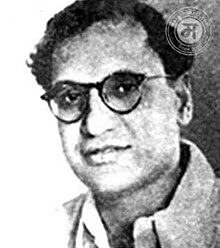Kusumagraj
| Kusumagraj | |
|---|---|

Vishnu Vāman Shirwādkar portrait
|
|
| Born |
27 February 1912 Pune, Maharashtra |
| Died | 10 March 1999 (aged 87) Nashik, Maharashtra |
| Nationality | Indian |
| Occupation | Poet, playwright, novelist, short story writer, humanist |
| Awards | 1974 Sahitya Akademi Award in Marathi 1987 Dnyanpith Award |
| Website | kusumagraj |
Vishnu Vāman Shirwādkar (27 February 1912 – 10 March 1999), popularly known by his pen name, Kusumāgraj, was an eminent Marathi poet, playwright, novelist, short story writer, apart from being a humanist, who wrote of freedom, justice and emancipation of the deprived, In a career spanning five decades starting in pre-independence era, he wrote 16 volumes of poems, three novels, eight volumes of short stories, seven volumes of essays, 18 plays and six one-act plays. His works like the Vishakha (1942), a collection of lyrics, inspired a generation into the Indian freedom movement, and is today considered one of the masterpieces of Indian literature, apart from his play, Natsamrat, which has an important place in Marathi literature. He was the recipient of several State awards, and National awards including the 1974 Sahitya Akademi Award in Marathi for Natsamrat, Padma Bhushan (1991) and the Jnanapith Award in 1987; he also remained chairperson of the Akhil Bharatiya Marathi Sahitya Sammelan in 1989.
He was born in Pune on 27 February 1912 as Gajanan Ranganath Shirwadkar. Upon being adopted, his named was changed to Vishnu Waman Shirwadkar. He later adopted the sobriquet 'Kusumagraj'. He pursued his primary education in Pimpalgaon and high school education in the New English School of Nashik, which is now called J.S. Rungtha High School of Nashik. He passed matriculation from Mumbai University. In 1944, he married Manorama (née Gangubai Sonawni).
While Shirwadkar was at the H. P. T. College in Nashik, his poems were published in the Ratnakar (रत्नाकर) magazine. In 1932, at the age of 20, Shirwadkar participated in a satyagraha to support the demand for allowing the entry of the untouchables in the Kalaram Temple at Nashik.
...
Wikipedia
